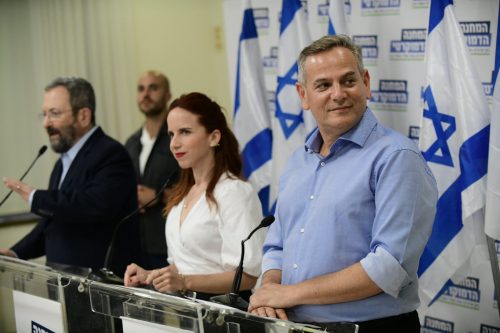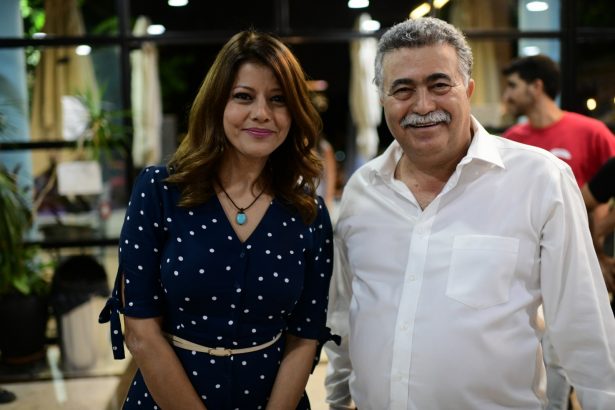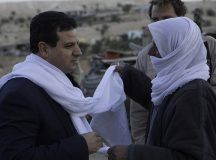‘If the public leans left, how come it keeps turning its back on the left at election time?’ asks Revital Almiran, a journalist at Maariv and former deputy director of the think tank Shaharit. She argues that while the Left will not achieve an electoral breakthrough in 2019, it is laying the foundations for its long-term political renewal. It is facing up to the challenges posed by identity politics that separates the left from its natural base, and a rising populism that delegitimises it. If, once again, the Left embraces a liberal, secular, anti-racist agenda, advances social democratic economics, and proposes a two-state solution with security, it may yet claim the future.
For twenty years, the Zionist Left in Israel has not won an election. In recent election campaigns, many have expressed fears that the Labor party (Haa’voda) and Meretz, the formal successors of the powerful labor movement that established the state and dominated its politics for decades, would vanish altogether. On 9 April, the Left won only 10 seats in the 120-seat Knesset, 6 for the Labor party and 4 for Meretz. So, what is the problem of the Zionist Left in Israel? I suggest we look at the role of identity politics and rise of populism which represent the largest obstacles to the revival of Zionist Left. Though, there are signs that the Left is finally finding the confidence to fight back.
If the Left has won the argument, why does it lose the elections? It’s the identity, stupid
Despite the weakness of the political parties of the left, the agenda of the left remains resilient because it is still in line with the aspirations of most Israelis. Despite a long period in which the right has been in power, the Left’s moderate, conciliatory stance towards the Israeli-Arab conflict, and its commitment to social justice values, remain popular.
While the two-state solution is less popular than in previous years, the most recent INSS poll on issues related to national security (2018) showed most respondents (62 per cent) are interested in an agreement, be this a ‘permanent’ agreement (40 per cent) or ‘interim agreements toward a permanent agreement’ (22 per cent). Moreover, 58 per cent support a two-state solution; only 9 per cent expressed interest in annexing Judea and Samaria, and only 15 per cent support maintaining the current situation.
In the social-economic realm, the demand for social justice, expressed in the largest social protests in Israel’s history in 2011, has not gone away. And nor have the demonstrations, albeit now on a smaller scale. Whether we are talking about stipends for people with disabilities, pensions, the provision of public housing, the basic request of the Israeli citizen is for the state to take responsibility for their economic security, not leave them to the brutality of the free market.
During its short history, Israel transformed from a welfare regime reflecting social democratic principles to a one emphasising neoliberal principles. The gradual liquidation of the welfare state and privatisation and commercialisation of its services started in the 1980s. The shift included a reduction of state investment in education, health, housing and social services. According to The Taub Center for Social Policy Studies, the expansion of the economic gaps and the sharpening of social inequality were a direct result of the neoliberal agenda. Since the early 2000s, the percentage of Israeli families living in poverty, and degree of inequality between citizens, have remained among the highest in the OECD.
Israeli Jews, according to the JTA’s survey from 2016, look to the government to better their lives. Nearly 60 per cent of them prefer a ‘Scandinavian model’ economy, with high taxes and a robust welfare state, over an ‘American model’ with lower taxes and fewer government services. Nearly half of Israeli Jews (45 per cent) say they want more government involvement in the economy. Majorities of Israelis also want the government to spend more on the following sectors: health, police, education, academia, transit, welfare and housing.
So, if the public leans left, how come it keeps turning its back on the Left at election time? The main answer is the historic, ethnic resentment of the lower classes, especially the so-called ‘Oriental’ (Mizrahi), towards the well-to-do classes, mostly characterised as ‘western’ Jews (Ashkenazi). Even though ethnic origin no longer predicts class as clearly as it once did, Labor and Meretz have not managed to break out of their traditional circles of support and link up to the oriental public which, since the victory of Menachem Begin in 1977, has been committed in its great majority to the Likud party.
This rift between Mizrahi and Ashkenzi Jews goes back 70 years. In the 1950s, the left in power only established a very partial welfare state. While the communities of Ashkenazi Jews benefited from social services, social security and respect, the communities in the periphery, usually inhabited by Mizrahi Jews, had to be satisfied with less support and experienced discrimination and alienation. In the 1960s and 1970s, due to a Mizrahi campaigning, the welfare state was broadened. But still today, after 20 years of the right in power, the resentment at what is perceived as the ‘left-wing establishment’ continues to take a toll. The old feelings of fury have not been healed.
The right, especially Likud leaders during election times, make cynical use of this fury and seize every opportunity to stoke it. Moreover, in recent decades, the left has dropped its social democratic ideas, collaborating with the process of dismantling the welfare state and privatising health, education and other social services. Little wonder the left became identified with a well to do Ashkenazi class.
While the Likud does not provide the Mizrahi lower classes with significant economic mobility, it knows how to compensate them with a powerful sense of pride and belonging.
Populism and incitement: a surrender without a fight
And this brings us to the second obstacle standing between the Left and a return to power: the populist turn taken by Israeli politics. Prime Minister Netanyahu has been the chief importer of American political culture into Israel these last decades, inserting populist rhetoric into Israeli public discourse. Following Trump and other populist leaders such as Orban and Erdogan, Netanyahu has promoted the idea that the majority of Israeli public is undermined and exploited by a small, leftist elite that controls the media and the court system. This elite also persecutes Netanyahu personally and will not be satisfied until he is driven from office. It is framed as operating as a state within state (a ‘deep state’), with hidden networks working against the right and Israeli majority ( ‘the people’). His complicated personal legal situation (Israel’s attorney general, Avichai Mandelblit, announced that he planned to indict him on charges of bribery, fraud and breach of trust pending a hearing) is equated with the victim-like situation of his supporters.
Netanyahu’s populist rhetoric goes beyond turning the Left into a hated ‘establishment’ and enemy of the people. During his years in office, ‘leftists’ have been made into the ultimate scapegoat, responsible for all troubles, and labelled as ‘anti-Zionist’ or even ‘traitors’. Everybody remembers the statement he whispered in the ear of the late Sephardi kabbalist Rabbi Yitzhak Kadourie in 1997, which was caught on camera: ‘the left forgot what it means to be Jewish.’ In the 2016 campaign in a video on Facebook, he warned that ‘the right-wing government is in danger. Arab voters are going en masse to the polls. Left-wing NGOs are bringing them on buses.’
Bibi’s populist campaign against the left is not only rhetorical. In 2016, Israel’s parliament passed the ‘NGO Law’ that stigmatised left-wing and human rights organisations in Israel as agents of foreign powers that try to impose on the Israel public notions alien to it. The law applies only to organisations that are funded mostly by foreign state entities (not by foreign individuals), forcing them to prominently declare their foreign funding in any publication or public engagement such as media appearances or events. One should bear in mind that Israel already had very strict transparency laws and that most leftish organisations are supported by European sources. Indeed, of 27 organisations affected by the law, 25 are left-wing or human rights groups.
Netanyahu’s populist rhetoric is consistently backed up by envoys in the media and by some semi-intellectual publicists who provide it with a ‘theory’ of sorts. One should keep in mind the major role played by Israel Hayom, a daily newspaper founded in 2007 and distributed free of charge. Known as Bibiton’, (a combination of Benjamin Netanyahu’s nickname ‘Bibi’ with the Hebrew word for newspaper, ‘iton’ ), it is funded by Sheldon Adelson, Netanyahu’s billionaire supporter. Studies published in The Seventh Eye revealed Israel Hayom‘s coverage was biased in favour of Netanyahu in most editorial decisions, and that the paper chooses to play down events that do not promote a positive image for Netanyahu, while inflating events that positively promote Netanyahu and the Likud.
Netanyahu reinforces his audience’s self-image as a disdained and persecuted majority and their sense that their great victimiser is ‘the Left’. Consequently, ‘left’ has become a curse word in Israel, a synonym for weakness and for cooperation with the enemy (mostly Arabs). According to a ‘Hatred Report’ (Hebrew) from the Berl Katzenelson Centre on expressions of hate and incitement on the internet, in 2016, 50 per cent of hate speech was directed towards the Arabs, 20 per cent towards ‘leftists’.
This long process of delegitimisation found no effective response on the Left. Perhaps this camp never really recovered from the political assassination of its leader, PM Yitzhak Rabin. Some say the problem of the Left began then when, instead of fighting back against the horrible incitement coming from the Right, it first mourned and then felt it had to pursue reconciliation. Whether the problem started 24 years ago or more recently, one thing is for sure: the Left has not developed a strategic response to populism.
Worse, some recent Labor party leaders have even internalised the bad image the Right attached to their camp and have run away from core leftist ideals. Each was trying to win over right-wing voters but, in doing so, they collaborated with the Right’s project of making the Left ashamed of itself and demoralised.
The Right’s narrative, according to which the Oslo Accords were a huge mistake and social democracy archaic, oppressive and irrelevant, was never given an effective reply. After the failure of the Camp David summit and outbreak of the Second Intifada, the Left remained mute and left-wing voters wandered off to a series of ‘centre’ parties with blurred agendas such as Kadima, Yesh Atid and, now, Kachol Lavan.
The Left and the September Poll
Israel is going back to the polls in September after Netanyahu failed to form a new government following the April election. The Left has another chance and it seems it has learned some lessons. It is now represented by two joint slates: one is composed of the democratic Israel headed by former PM Ehud Barak, Meretz Chair Nitzan Horowitz, the green movement, and Labor MK Stav Shafir. The second is the union between Amir Peretz, the new head of the Labor party, and Orly Levy Abekasis’s party, Gesher, which at the last elections made its pitch to lower social economic layers, especially the Mizrahi Jews living in the periphery. Both Levi Abekasis and Peretz are Moroccan-heritage Jews who have lived their whole life in the periphery of Israel. Levi Abekasis is the daughter of David Levi, an ex-Likud and one of its great symbols of its supposed Mizrahi, working class orientation.
 [Photo: Ehud Barak (Left), Stav Shaffir (Centre), and Nitzan Horowitz (Right), the leaders of the Democratic Union.]
[Photo: Ehud Barak (Left), Stav Shaffir (Centre), and Nitzan Horowitz (Right), the leaders of the Democratic Union.]
Many hoped to see one big left-wing party, but Peretz slammed the door on that idea, saying ‘merging with Barak and Meretz will deter certain populations from joining us and being part of the revolution.’ Many on the left have expressed their fury at Peretz’s decision to unite with Levi Abekasis since she was formerly a member of a very rightist party, Yisrael Beiteinu. Others were uncomfortable with the new, oriental branding of Labor. As a result, many leftists announced that they prefer giving their vote to the democratic camp. Peretz sees this behavior as proof that Labor is detached from those who should really be its authentic voters.
New Foundations: Labor’s Economics, the Democratic Camp’s Courage
Two weeks ago, the Labor-Gesher joint slate presented a revolutionary economic program, differing themselves sharply from the ‘Bibi’s piggish capitalism’ and ‘Lapid’s (a main leader of Kachol Lavan) compassionate capitalism’. This ambitious plan is the core of their campaign and would cost 30 billion shekels. It includes raising the minimum wage to 40 shekels an hour, a ban on contract workers, reform of the housing market under which the government would build 200,000 apartments, free education for children at all ages, governmental investments in healthcare, a minimum 6000 NIS pension and more. ‘The voters of the Likud’, Peretz said, ‘are not the problem, they are the solution’. In accordance to this, he keeps tweeting videos in which inhabitants of the periphery state for the first time in their life why they are not going to vote for the Likud, but for the Labor-Gesher joint slate.
The democratic camp, has taken on the task of rejuvenating the Left’s self-respect. Without doubt, the return of a bullish and enthusiastic former commander in chief of the IDF, Ehud Barak, has ignited the Left with passion to fight back against any attempt to delegitimise it. Unsurprisingly, the core word in the democratic camp campaign is ‘courage’. It appears over and over again in their billboards, videos and tweets. Once again, the Left is proud to hold a liberal, secular, anti-racist agenda as well as being committed to the two-state solution.
Moreover, by adding Rabin’s grand daughter Noa Rothman to the list, the democratic camp is seeking to give back to the word Shalom (peace) a new respect and relevancy. Recently, Barak introduced a plan for ‘regional arrangement and negotiation or separation’, emphasising the need for a strong Israel to strive for separation from the Palestinians, or, at least in the short term, to set a border that would preserve the separation option for the future. ‘The rightish path of one state is the only existential threat for the future, identity and security of Israel. Worse than terror and even from the Iranian threat’, Barak warned in Ha’aretz.
The democratic campaign’s main focus is to raise the alarm about the danger of the country being dragged down an anti-democratic, populist slippery slope by the Right. The majority of Barak’s tweets, videos and interviews are dedicated to showing Bibi and the far right destroying Israeli democracy and weakening its gatekeepers. Recently, Barak and members of the democratic camp showed up to the demonstration against corruption taking place near Attorney General Avichai Mandelblit’s home in Petach Tikva. The protest is ongoing and provocative. The activists demand that Mandelblit move to indict Prime Minister Netanyahu in the corruption cases into his affairs. The democratic camp came to show solidarity with the protestors after the police arrested and treated some of them aggressively a week before.
In these last days of August, the election campaign is still sleepy. Many Israelis are on vacation and for many it is just too hot and humid to pay attention to politics. Hence, the polls are stable. A Channel 12 News poll published on 23 August shows Kachol Lavan winning the same projected seats as the Likud (30). The left parties are slated to win 13 seats (seven for the democratic camp and six for the Labor–Gesher), three more mandates than in the April election. For sure, this is far away from a renewal of the Left, and once the national campaigns of Kachol Lavan and the Likud get into full swing during the last two weeks before the 17 September poll, both left coalitions may be squeezed.
Still, Peretz and Barak have managed to make authentic left ideas shine again, and Haa’voda-Gesher and the democratic camp were the only parties that welcomed the head of the Joint List Ayman Odeh’s historic statement that he is willing to enter a coalition. At this point, everything is open. One thing is for sure, the political left has now laid the foundation for its revival.






































Comments are closed.